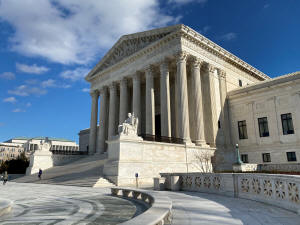US Supreme Court rebuffs Florida city's challenge to atheist lawsuit
 Send a link to a friend
Send a link to a friend
 [March 07, 2023]
By John Kruzel [March 07, 2023]
By John Kruzel
WASHINGTON -The U.S. Supreme Court on Monday declined to hear a Florida
city's bid to fend off a lawsuit by atheists accusing officials of
violating constitutional limits on government involvement in religion by
staging a prayer vigil following gun violence that wounded three
children.
The justices turned away an appeal by the city of Ocala of a lower
court's ruling endorsing the right of the plaintiffs, backed by the
American Humanist Association, to sue over legal harms they said they
sustained attending the 2014 vigil in which uniformed police chaplains
preached a Judeo-Christian message.
The plaintiffs accused Ocala of violating the U.S. Constitution's First
Amendment "establishment clause," which restricts governmental
involvement in religion. Ocala had urged the justices to reject the
claim that the plaintiffs, as "offended observers" of religious
messages, had sustained legally recognizable injuries.
Conservative Justice Clarence Thomas, dissenting from the decision to
reject the appeal, expressed "serious doubts" about the legitimacy of
lawsuits by offended observers.

"Offended observer standing appears to warp the very essence of the
judicial power vested by the Constitution," Thomas wrote, adding that
"federal courts are authorized 'to adjudge the legal rights of litigants
in actual controversies,' not hurt feelings."
Thomas has taken a broad view of religious rights during more than three
decades as a justice.
Conservative Justice Neil Gorsuch separately wrote that he agreed with
denying the appeal at this stage of the litigation but expressed doubt
that the plaintiffs had proper legal standing to sue.
Ocala city officials helped organize and conduct the one-hour prayer
vigil following a series of shootings in which three children were
struck by stray bullets. Ocala's police department on its Facebook page
posted a letter co-signed by the police chief and an activist affiliated
with a local Baptist church that promoted the vigil and urged "fervent
prayer" to help reduce crime in the community.
At the vigil, police chaplains "preached Judeo-Christian religion to the
crowd in a style consistent with revivalist and evangelical religion,"
"participated in religious worship" and encouraged the crowd to engage
in "responsive chanting," the plaintiffs wrote in court papers.

[to top of second column]
|

The building of the U.S. Supreme Court
is pictured in Washington, D.C., U.S., January 19, 2020. Picture
taken January 19, 2020. REUTERS/Will Dunham

The American Humanist Association, which on its website says it
seeks "to bring about a progressive society where being good without
a god is an accepted and respected way to live life," and several of
its members sued in federal court. The case has been narrowed to two
plaintiffs, Lucinda Hale and Art Rojas, and a single defendant, the
city.
Sunil Panikkath, the association's president, welcomed the court's
decision to deny the city's appeal.
"As opponents to the separation of religion and government continue
their anti-democratic agenda in their attempts to obliterate the
line between church and state, our work defending that separation
becomes ever more important to ensure the religious freedom of all
Americans," Panikkath said.
A judge in 2018 ruled in favor of the plaintiffs, awarding nominal
monetary damages of $1 each. The Atlanta-based 11th U.S. Circuit
Court of Appeals threw out that judgment in light of a 2022 Supreme
Court ruling expanding religious rights in the case of a Washington
state public high school football coach who was suspended for
refusing to stop leading Christian prayers with players on the field
after games.
The 11th Circuit found that at least one of the plaintiffs, Hale,
had proper standing to sue because the vigil caused a legally
recognizable injury. Hale has argued that by violating the
establishment clause the city injured her by favoring religion and
excluding atheists like her from participating in a vigil focused
exclusively on prayer.
A federal judge will now weigh the establishment clause claims in
light of the football coach ruling.

A spokesperson for the American Center for Law and Justice, which
represents Ocala, said: "The case continues in trial court and we
will continue to litigate."
The conservative-majority Supreme Court in recent years has chipped
away at the wall separating church and state, eroding American legal
traditions aimed at barring government officials from promoting any
particular faith.
(Reporting by John Kruzel; Editing by Will Dunham)
[© 2023 Thomson Reuters. All rights
reserved.]This material may not be published,
broadcast, rewritten or redistributed.
Thompson Reuters is solely responsible for this content. |